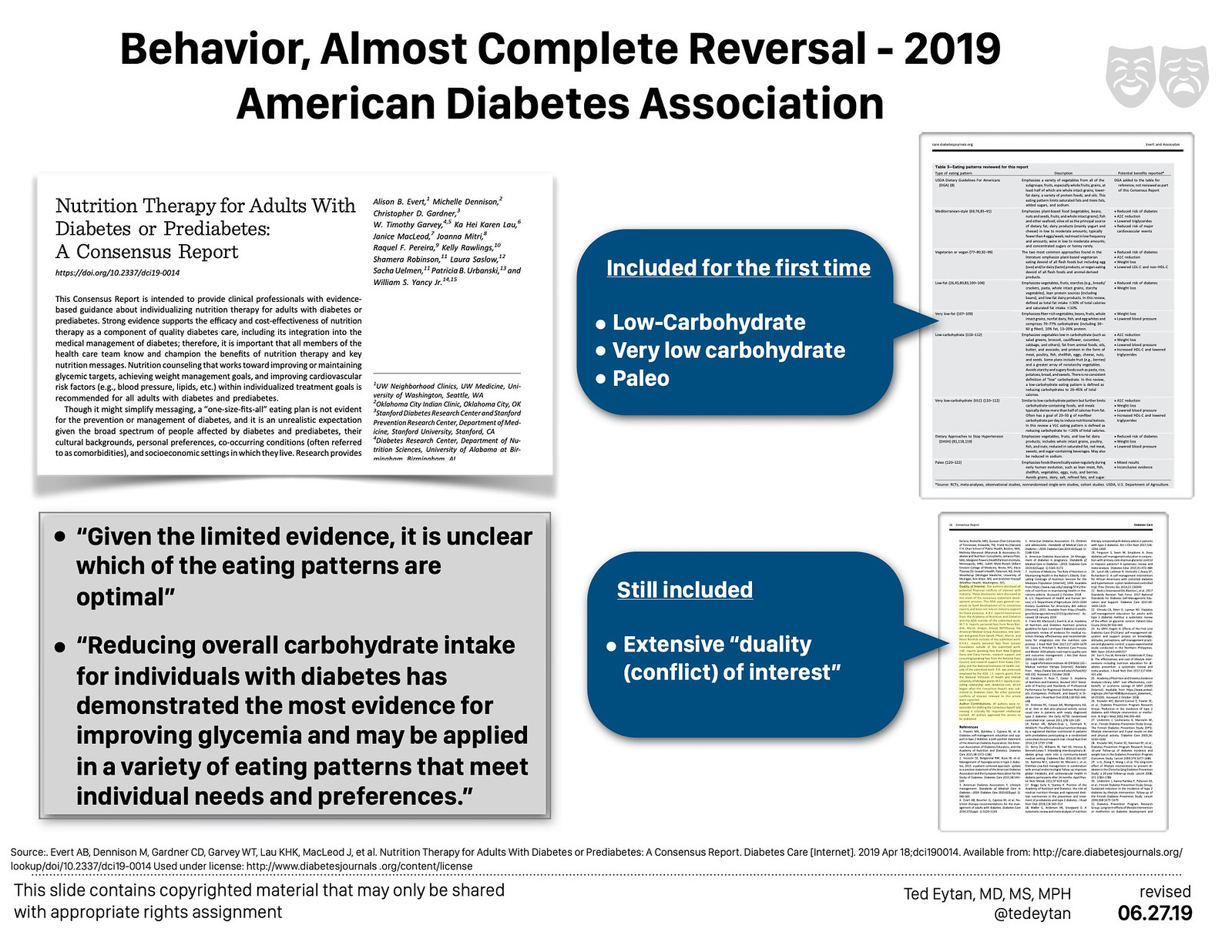
For as long as I’ve been following Dr. Sarah Hallberg’s (@DrSarahHallberg) work, she’s been following the progression of American Diabetes Association (@AmDiabetesAssociation) guidelines for nutrition therapy and eating guidelines in diabetes.
I give her credit for turning my attention toward metabolic health instead of obesity, and toward an interest in the ADA’s work.
FUN FACT – The @AmDiabetesAssn guidelines 2018 recommend eating patterns graded at a level B recommendation. One pattern – DASH diet. There is a SINGLE STUDY of 31 people to support the DASH diet for T2D. Houston, we have a problem…..our "evidence based" has no evidence!
— Dr. Sarah (@DrSarahHallberg) February 14, 2018
Guidelines for Guidelines
This paper, co-written with additional experts in diabetes management (including reversal, including Type 1 – @JakeKushnerMD) looks at the way the guidelines have been developed and their evidence base. Even I, as a much more casual observer, have noticed:
- Tendencies to include and exclude studies with a hint of bias (“cherry picking”)
The authors of the ADA guideline documents, in their evaluation of a low-carbohydrate eating pattern, raise concerns about the quality of evidence that they do not apply to other dietary patterns. For example, regarding low-carbohydrate diets, the 2014 recommendations state, “many of the studies were small, were of short duration, and/or had low retention rates.” However, these issues could apply to plant-based and DASH eating patterns as well.Hallberg SJ, Dockter NE, Kushner JA, Athinarayanan SJ. Improving the scientific rigour of nutritional recommendations for adults with type 2 diabetes: A comprehensive review of the American Diabetes Association guideline‐recommended eating patterns. Diabetes, Obes Metab [Internet]. 2019 May 9;dom.13736. Available from: https://onlinelibrary.wiley.com/doi/abs/10.1111/dom.13736
- Substantial conflicts of interest disclosed on the part of guideline authors (they refer to it as “duality” nowadays, can there be such a thing?)
Most members of PPC were conflicted: Only 3/14 on SOC committee had no COI, and only 5/11 on Nutrition Therapy Panel had no COI.Hallberg SJ, Dockter NE, Kushner JA, Athinarayanan SJ. Improving the scientific rigour of nutritional recommendations for adults with type 2 diabetes: A comprehensive review of the American Diabetes Association guideline‐recommended eating patterns. Diabetes, Obes Metab [Internet]. 2019 May 9;dom.13736. Available from: https://onlinelibrary.wiley.com/doi/abs/10.1111/dom.13736

- Significant transformation of the recommendations in the last 2 years, in a more science based way. The recommendations now cover prediabetes as well as diabetes, and specifically include low carbohydrate and very low carbohydrate eating patterns, therefore making them applicable to over 50% of the American population instead of about 12 – 14 % previously.

Evidence base for the guidelines themselves
The authors reviewed the studies included in the ADA guidelines and did their own search and evaluation of these studies plus studies that were not included. One of the critiques of the guideline process is that there is no external review, confidential or not, and there is no participation of patients and the public. In a sense, this is an external review and should be welcomed by the medical community – our interest is having the information needed to support the people we serve. If there were 100 of these reviews published, we would be even better served, especially for a population affected being so large.
I hope the ADA will consider including patients/the public in future guideline production. It’s the right thing to do, it’s been protoyped successfully in every corner of medicine, and there’s already a bright spot in the organization with it having its first ever CEO who has diabetes herself, Tracey Brown, with the most appropriate twitter handle: @Type2CEO.
I predict that the ADA will one day thank Sarah, Jake, and a global movement of physicians at their side for engaging the medical profession in their work. They’ve put the spotlight on diabetes and prediabetes like the medical profession has never been able to do. We should rally together to see a world without both in our lifetimes.
This is good news…A lot of people owe @ProfTimNoakes and @FructoseNo (and their families) huge apologies. Don't hold your breath for that to happen. These heros cared more about the well-being of their patients than what the "experts" thought of them. https://t.co/eHlXGSY4IL
— Brian Lenzkes, MD (@BrianLenzkes) June 10, 2019
Reference
Content in slides above used under @CreativeCommons license
Hallberg SJ, Dockter NE, Kushner JA, Athinarayanan SJ. Improving the scientific rigour of nutritional recommendations for adults with type 2 diabetes: A comprehensive review of the American Diabetes Association guideline‐recommended eating patterns. Diabetes, Obes Metab [Internet]. 2019 May 9;dom.13736. Available from: https://onlinelibrary.wiley.com/doi/abs/10.1111/dom.13736
https://twitter.com/JakeKushnerMD/status/1139883855777882115
My Disclosures
Of course I have them – disclosures, yes, conflicts, no 🙂 . Check out my disclosures page. I’m here because have a desire to know, it’s why we came to health care, for the people we serve.
